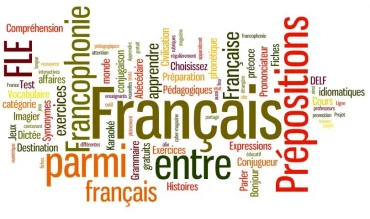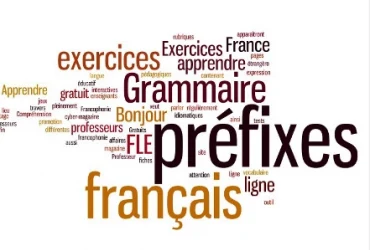
- 357 Lê Hồng Phong, P.2, Q.10, TP.HCM
- Hotline 1: 1900 7060
Hotline 2: (028) 3622 8849
Bài 5 : Expressions impersonnelles
Expressions impersonnelles Không có một chủ ngữ cụ thể. “Chủ ngữ giả” của câu có thể là “il” hoặc “ce”, tương tự như trong tiếng Anh là “it”
Tất cả các câu trong tiếng Pháp ở thể không ngôi đều bắt đầu bằng il est hoặc c’est mà không tạo ra sự khác biệt về nghĩa, tuy nhiên có thể nói “c’est” thì ít trang trọng hơn là “il est”. Vì thế, “c’est” thường được sử dụng nhiều trong giao tiếp, còn “il est” thì được sử dụng trong văn viết.
Có 2 cách để tạo ra thể không ngôi :
1. Il est / c’est +adj +que+ mệnh đề phụ.
Động từ ở mệnh đề phụ thường được chia ở dạng indicatif hoặc subjonctif, tùy vào ý nghĩa mà câu biểu đạt.
Il est probable que David le fait / C'est probable que David le fait.
có lẽ là David đang làm đó.
Il est possible que David le fasse / C'est possible que David le fasse.
có thể David đang làm đó.
2. Il est / c’est +adj + giới từ + infinitif
Dùng giới từ nào còn tùy thuộc vào loại chủ ngữ
a. Khi chủ ngữ là giả, sử dụng giới từ “de”
Expressions impersonnelles + de + intransitif infinitif
Il est difficile de parler / C'est difficile de parler.
Khó nói lắm.
Expressions impersonnelles + de + transitif infinitif + complément d'objet indirect
Il est important de dire la vérité / C'est important de dire la vérité.
nói sự thật là điều rất quan trọng.
b. Khi chủ ngữ là thật và động từ nguyên mẫu được sử dụng mang nghĩa bị động, chúng ta sử dụng giới từ “à”
Il est bon à savoir / C'est bon à savoir.
thật tốt khi biết (điều đó.)
Il est difficile à faire / C'est difficile à faire.
(cái đó) khó làm.
Những cách biểu đạt sử dụng thể không ngôi phổ biến nhất trong tiếng Pháp
|
Il est certain / C'est certain |
|
It's certain |
|
Il est clair / C'est clair |
|
It's clear/obvious |
|
Il est convenable / C'est convenable |
|
It's proper/fitting |
|
Il est difficile / C'est difficile |
|
It's difficult |
|
Il est dommage / C'est dommage |
|
It's too bad |
|
Il est douteux / C'est douteux |
|
It's doubtful |
|
Il est essentiel / C'est essentiel |
|
It's essential |
|
Il est étonnant / C'est étonnant |
|
It's amazing |
|
Il est étrange / C'est étrange |
|
It's strange |
|
Il est évident / C'est évident |
|
It's obvious |
|
Il est facile / C'est facile |
|
It's easy |
|
Il est faux / C'est faux |
|
It's false |
|
Il est heureux / C'est heureux |
|
It's fortunate |
|
Il est honteux / C'est honteux |
|
It's shameful |
|
Il est important / C'est important |
|
It's important |
|
Il est impossible / C'est impossible |
|
It's impossible |
|
Il est improbable / C'est improbable |
|
It's improbable |
|
Il est indispensable / C'est indispensable |
|
It's essential |
|
Il est injuste / C'est injuste |
|
It's unfair |
|
Il est inutile / C'est inutile |
|
It's useless |
|
Il est juste / C'est juste |
|
It's right/fair |
|
Il est naturel / C'est naturel |
|
It's natural |
|
Il est nécessaire / C'est nécessaire |
|
It's necessary |
|
Il est normal / C'est normal |
|
It's normal |
|
Il est obligatoire / C'est obligatoire |
|
It's necessary |
|
Il est peu probable / C'est peu probable |
|
It's not likely |
|
Il est possible / C'est possible |
|
It's possible |
|
Il est probable / C'est probable |
|
It's probable |
|
Il est rare / C'est rare |
|
It's rare |
|
Il est regrettable / C'est regrettable |
|
It's regrettable |
|
Il est sûr / C'est sûr |
|
It's sure/certain |
|
Il est surprenant / C'est surprenant |
|
It's surprising |
|
Il est temps / C'est temps |
|
It's time |
|
Il est triste / C'est triste |
|
It's sad |
|
Il est urgent / C'est urgent |
|
It's urgent |
|
Il est utile / C'est utile |
|
It's useful |
|
Il est vrai / C'est vrai |
|
It's true |
>> Xem thêm: http://hoctiengphap.com/v77/bai-1.html
THƯ VIỆN LIÊN QUAN

Giới từ “ENTRE” và “PARMI”

Les préfixes
Hoặc gọi ngay cho chúng tôi:
1900 7060
 | Chính sách bảo mật thông tin | Hình thức thanh toán | Quy định chung
| Chính sách bảo mật thông tin | Hình thức thanh toán | Quy định chung
Giấy chứng nhận đăng ký doanh nghiệp số 0310635296 do Sở Kế hoạch và Đầu tư TPHCM cấp.
Giấy Phép hoạt động trung tâm ngoại ngữ số 3068/QĐ-GDĐT-TC do Sở Giáo Dục và Đào Tạo TPHCM cấp